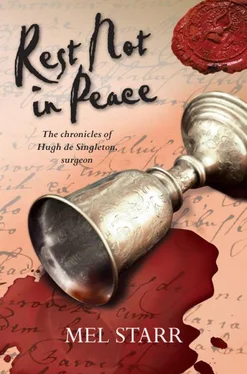Mel Starr - Rest Not in Peace
Здесь есть возможность читать онлайн «Mel Starr - Rest Not in Peace» весь текст электронной книги совершенно бесплатно (целиком полную версию без сокращений). В некоторых случаях можно слушать аудио, скачать через торрент в формате fb2 и присутствует краткое содержание. Год выпуска: 2013, Издательство: Lion Fiction, Жанр: Исторический детектив, на английском языке. Описание произведения, (предисловие) а так же отзывы посетителей доступны на портале библиотеки ЛибКат.
- Название:Rest Not in Peace
- Автор:
- Издательство:Lion Fiction
- Жанр:
- Год:2013
- ISBN:нет данных
- Рейтинг книги:4 / 5. Голосов: 1
-
Избранное:Добавить в избранное
- Отзывы:
-
Ваша оценка:
- 80
- 1
- 2
- 3
- 4
- 5
Rest Not in Peace: краткое содержание, описание и аннотация
Предлагаем к чтению аннотацию, описание, краткое содержание или предисловие (зависит от того, что написал сам автор книги «Rest Not in Peace»). Если вы не нашли необходимую информацию о книге — напишите в комментариях, мы постараемся отыскать её.
Rest Not in Peace — читать онлайн бесплатно полную книгу (весь текст) целиком
Ниже представлен текст книги, разбитый по страницам. Система сохранения места последней прочитанной страницы, позволяет с удобством читать онлайн бесплатно книгу «Rest Not in Peace», без необходимости каждый раз заново искать на чём Вы остановились. Поставьте закладку, и сможете в любой момент перейти на страницу, на которой закончили чтение.
Интервал:
Закладка:
Lord Gilbert must have thought it unseemly to serve an elaborate supper on such a day. The removes that evening were simple, even though ’twas not a fast day. His cook prepared capons farced, cormarye, rice moyle, and cabbage with marrow. And parsley loaf with honeyed butter. For the subtlety a simple chardewarden sufficed.
I had spent many hours in the past week watching Sir Henry’s household at their meals in the hall, seeking, but not finding, some sign of guilt in expression or behavior. Why should this supper be any different?
It did seem to me that most of Sir Henry’s retainers and family had little appetite, but that could not mean that they were all felons. Perhaps they worried that another death might be expected, and they might provide the corpse.
Lady Margery, who in the past had not hesitated to glare at me frequently from the high table, did not look even once in my direction during the meal. At least, not when I was observing her. She spoke little to Lady Petronilla, and seemed often to glance at the empty place to her right where Sir John had taken his meals.
Sir Geoffrey, to my surprise, took his normal place at the high table. Like all in the hall that evening, he was quiet and ate sparingly. But he did not look away when our eyes met. Either Lady Margery had not told him of my words to Lady Anne, or he believed he had nothing to fear, or he was a skilled player.
When the meal was done I joined Lord Gilbert in the solar, and together with Lady Petronilla we reviewed the week past, seeking some insight which had escaped us. We failed.
Lady Petronilla complained of feeling unwell, called for one of her ladies, and went to her chamber. I could think of nothing more to be done this day, so bid Lord Gilbert a good evening and departed for Galen House.
But before I left the castle I called upon William. The squire had not appeared this day for dinner or supper, and I wished to reassure myself that his nose was mending as should be.
The door to the squires’ chamber was open, allowing a breeze to cool the room on this warm summer evening. I found William seated at his table, which he had drawn to the window, writing upon a sheet of parchment. The fading light was yet enough to illuminate his work and at a glance I saw that he wrote well, with a hand as skilled as any monk’s.
The squire’s eyes were yet purple, beginning to turn to green and yellow. The effect was quite loathsome, together with his swollen nose, and I understood why the youth did not wish to present himself to Lady Anne in such a state.
It was no business of mine to whom William wrote, but my eyes fell upon the document and I saw that Lady Anne’s name was inscribed across the top of the leaf in a large, flourishing hand, easily readable from where I stood.
William had turned from his writing when he heard me enter his chamber, but returned for a moment to his work, completing a thought before he stood to greet me.
“You did not take supper in the hall,” I said by way of explaining my presence. “So I thought to see that all is well with you before I leave the castle for the night.”
“As well as might be,” William shrugged. “But I will be pleased when the linen plugs you thrust up my nose may be removed.”
I agreed that having to breathe through one’s mouth for a fortnight was not a pleasant prospect, but told William that he must resist the temptation to remove the wads before the time had expired. “If your nose should heal badly, skewed one way or the other,” I explained, “it might cause such an obstruction that you never again take a breath through your nostrils, and your nose may forever point to one side of your face or another.”
William said nothing while he contemplated such a fate.
“You write a fair hand,” I said, nodding to the parchment upon the table.
The youth would have blushed, I think, but for the pageant of colors which already marched across his face.
“Sir Henry’s chaplain taught us well,” he said.
“You and Robert?”
“Aye, and all who needed instruction.”
“Sir Henry wished his squires to be able to read and write?”
“Not only squires. Pages, grooms, valets, all in his service must be instructed. Sir Henry said times are not like as of old, when men needed only to work or fight, as their station demanded, and writing could be left to churchmen and scholars.”
“Was there no unlettered man in Sir Henry’s service?”
“Not that I know of. He’d not have it. Required Sir Geoffrey to learn when he entered his service.”
“I have heard that Sir Geoffrey was low-born,” I said. “Does he read and write with competence now?”
“Aye. Nearly as well as any man, though ’tis said learning letters is a thing best accomplished when young.”
“So ’tis said,” I agreed. “If you have no complaints I will leave you to your letter.”
William bowed, then turned back to his parchment, no doubt eager to complete his work before the light failed.
Here was perplexing news. The note Sir Roger found slipped under his chamber door was written in a poor hand. It was yet in my pouch, so I withdrew it as I crossed the castle yard and once again inspected it. The light was poor, but it was adequate to see that whoso wrote the message could not be said to write nearly as well as any man. Did Sir Geoffrey then not write this? Some man, or woman, did. Perhaps, if Sir Geoffrey was right-handed, he took quill in left hand to scrawl a message that would disguise its composer.
If ’twas not Sir Geoffrey who wrote Sir Roger’s note, who did so? Someone wished me to think Squire William guilty of Sir Henry’s murder. If Sir Geoffrey was the felon, why would some other try to set the sheriff after an innocent man? Would Lady Margery do so, perhaps being complicit in her husband’s death?
I studied the note again as I walked Mill Street toward my home. The letters were crude, and seemed to me not written in a feminine hand. They were large, square, and whoever had inscribed the letters had pressed the quill forcefully upon the parchment. I thought it likely a man had written the note, but if not Sir Geoffrey, then who? Surely the hand that held pen to this parchment also slew Sir Henry. Unless Sir Geoffrey commanded some other to write for him. This thought occupied my mind until I arrived at Galen House and Kate greeted me. Her embrace drove other considerations from my mind.
Bessie was tucked into her cot, and Kate’s hens had retired to the hen house, so all was quiet at Galen House. Kate covered the coals upon our hearth and we sat upon a bench in the fading light of the toft in companionable silence.
But Kate was unwilling to remain ignorant of the day’s events, and so after allowing me a time with my thoughts, asked of the news. I told her.
“Sir Geoffrey is the murderer, then,” she said.
“So it seems. He used the note to Sir Roger to turn suspicion to another when he learned that I had discovered the cause of Sir Henry’s death.”
“You think Lady Margery knew of his felony? Perhaps aided it?”
“She had the portpain in her possession, and Sir Geoffrey used a fragment of it to wipe away Sir Henry’s blood.”
“Will you charge them both?”
“Probably.”
“Probably? You have some doubts?”
“I can understand Sir Geoffrey doing Sir Henry to death… and Lady Margery aiding in some way. But why slay Sir John?”
“Did not the squire say that Sir John was also fond of Lady Margery? Perhaps Sir Geoffrey wished to be rid of a rival.”
“’Tis the only answer which makes sense,” I agreed. “But if I knew or understood more, perhaps another explanation would also make sense. Or make better sense.”
“What more do you need to know?”
Читать дальшеИнтервал:
Закладка:
Похожие книги на «Rest Not in Peace»
Представляем Вашему вниманию похожие книги на «Rest Not in Peace» списком для выбора. Мы отобрали схожую по названию и смыслу литературу в надежде предоставить читателям больше вариантов отыскать новые, интересные, ещё непрочитанные произведения.
Обсуждение, отзывы о книге «Rest Not in Peace» и просто собственные мнения читателей. Оставьте ваши комментарии, напишите, что Вы думаете о произведении, его смысле или главных героях. Укажите что конкретно понравилось, а что нет, и почему Вы так считаете.












